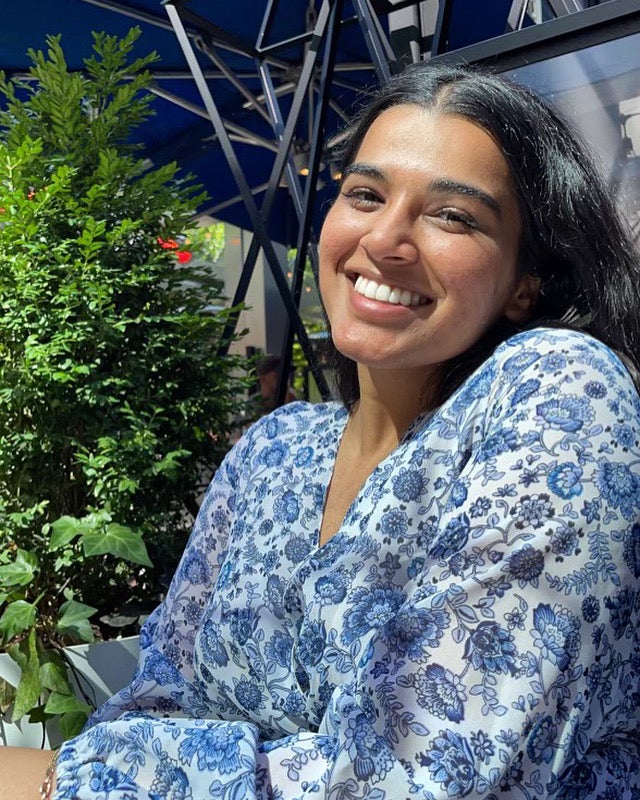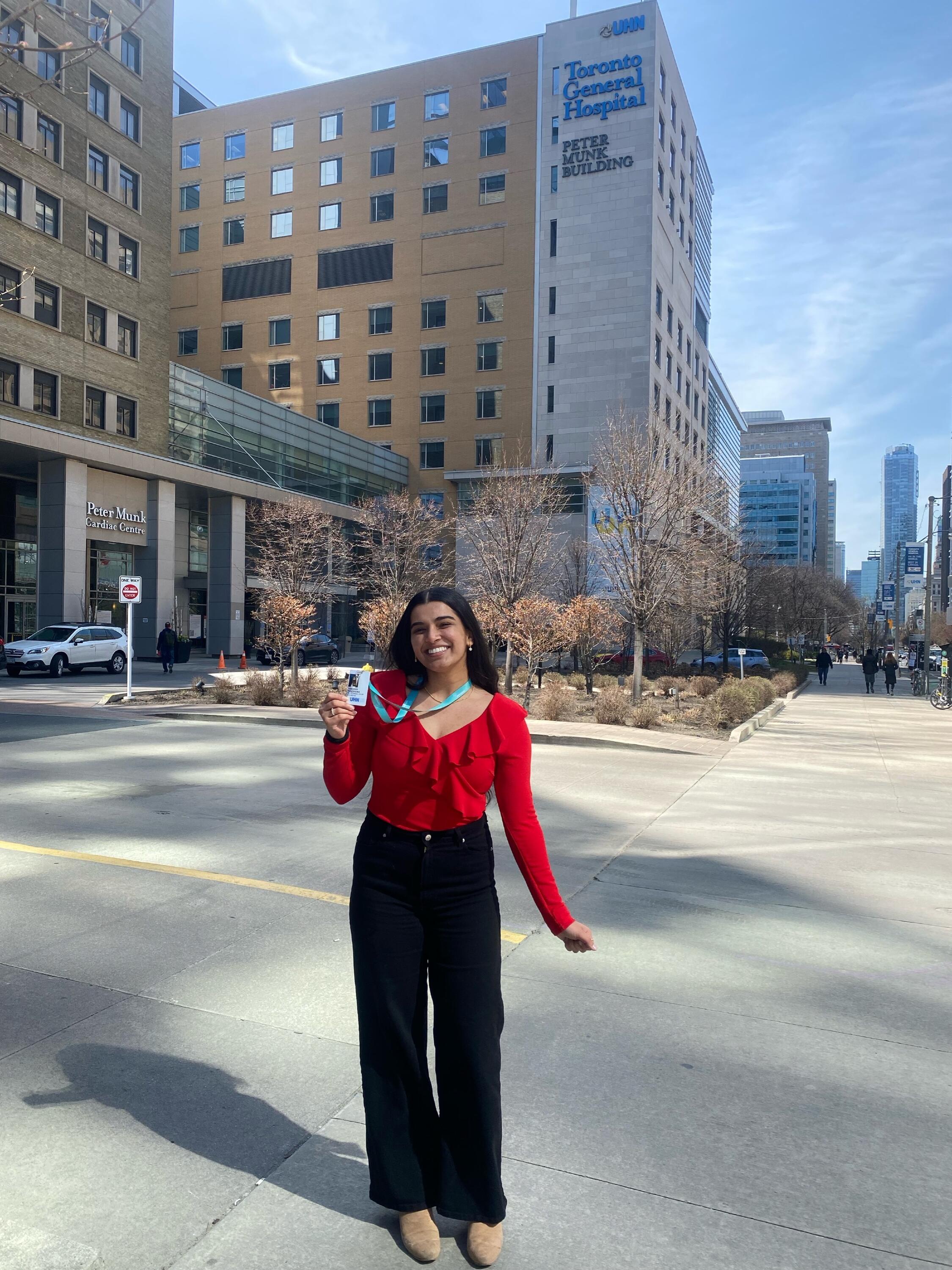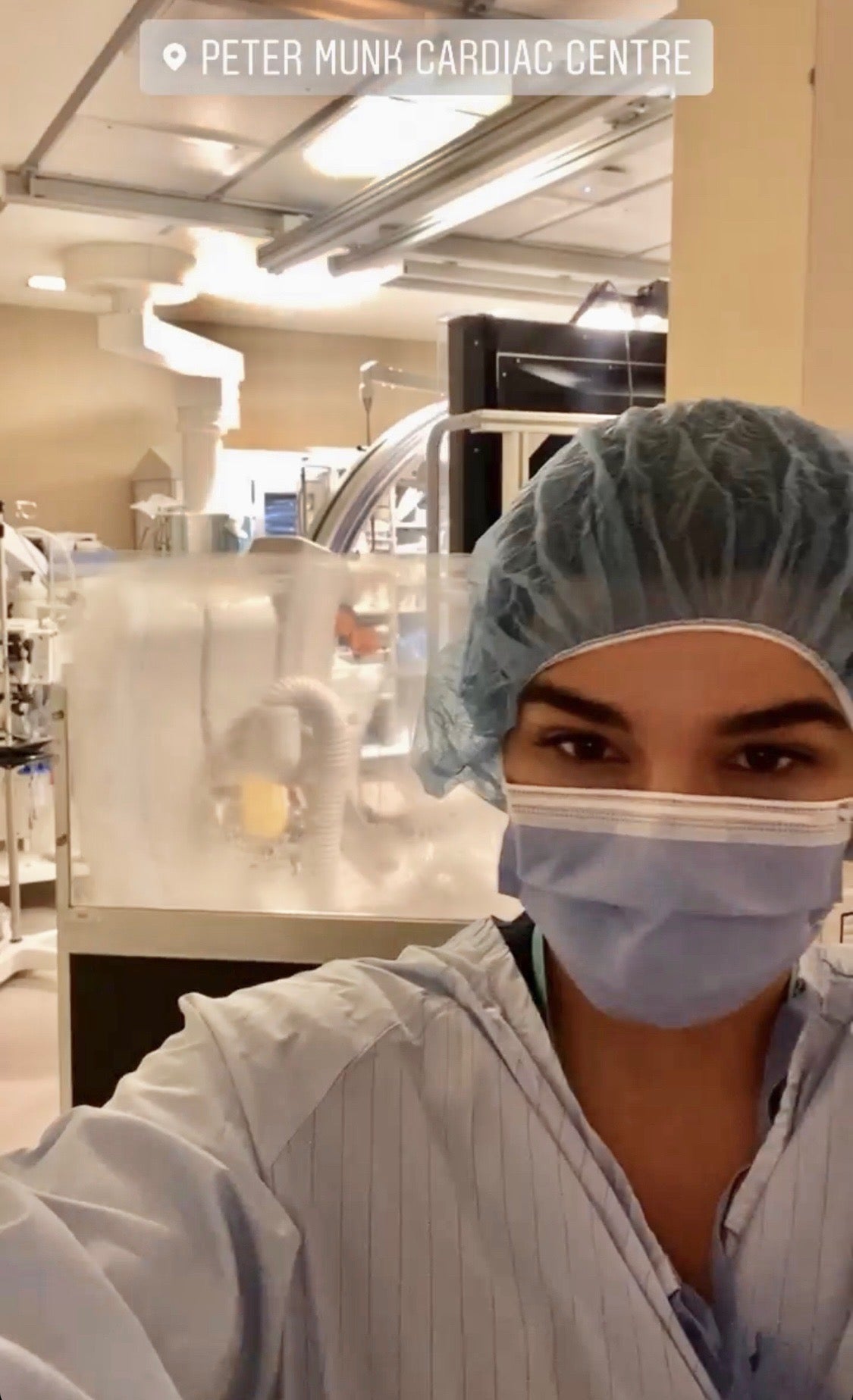 Hi! My name is Tanveer Randhawa and I am excited to share my academic, professional and personal experiences over the last few years as a Health Science co-op student at the University of Waterloo.
Hi! My name is Tanveer Randhawa and I am excited to share my academic, professional and personal experiences over the last few years as a Health Science co-op student at the University of Waterloo.
What year and program are you in?
I am currently in my 4A term as a Bachelor of Science (B.Sc.) Honours Health Science student. I am pursuing a minor in Medical Physiology, a specialization in Pre-Clinical, as well as a Diploma in Gerontology. A combination of these three-degree additions has helped me gain a more comprehensive and balanced academic experience.
Being a pre-med student, it was very important that I not only focus on the traditional sciences (i.e., biology, chemistry, physics) but that I also expand my knowledge base to be a more well-rounded student by taking courses in psychology, sociology, philosophy, health informatics and research.
How many co-op work terms have you done and where?
Over the past two years, I have had a total of four co-op work terms.
My first co-op work term was with Trillium Health Partners where I worked as a project analyst for their OneTHP EPIC HIS Implementation Project. During this term, I had the opportunity to collaborate with numerous OneTHP project managers and co-op students on different tasks such as Meditech Consolidation, GoLive Harmonization, and BioMed Integration to meet their GoLive date. I was also fortunate enough to work on designing training modules for EPIC to help introduce and familiarize the new hospital information system for physicians and nurse practitioners.
My second co-op work term was with the University of Waterloo's School of Public Health Sciences (SPHS) as a graduate programs assistant. I was fortunate enough to make connections with multiple individuals from SPHS and the Faculty of Health - including students in their Master’s or Ph.D. programs. During this placement, I assisted with directing prospective student inquiries while also playing a role in the matriculation of new students to the various graduate programs offered by SPHS. Through this, I explored the many different options that are available for individuals that are interested in healthcare and are looking to further their knowledge post-undergrad.
My third co-op work term was with the Region of Peel as COVID-19 vaccine community clinic administration and operation support. This is where I was able to play a small but significant role in helping my community reach a high level of vaccination at the height of the COVID-19 pandemic. I helped facilitate a safe and efficient clinic that welcomed over 2000 patients daily – which is why it was very important to ensure that safety standards were being met during vaccination appointments. I also had the opportunity to assist supervisors with the training of new hires and inventory management of the different vaccines offered by the region.
My fourth and final co-op work term was with the University Health Network as EPIC HIS synapse project EUD coordinator & support analyst. As the co-op team lead at Toronto General Hospital working with the End User Devices and Technical Team, I held the responsibility to manage many different tasks. These tasks included scheduling the testing of different inpatient and outpatient units throughout the hospital, training newly hired employees, facilitating communication and knowledge transfer of EPIC with unit directors and nurse managers, managing the daily tested numbers and reporting progress to project managers during team meetings. Ultimately, our work at the University Health Network paved the pathway for the hundreds of new employees that UHN hired for elbow support during the June 4 GoLive!
 How do you think these experiences have helped you develop yourself?
How do you think these experiences have helped you develop yourself?
I have always been keen to learn and take on a lot of responsibility – this is characteristic of my natural leadership and learner skills. I chose to do co-op because I wanted to gain some hands-on experience in the healthcare industry and work in environments where I aim to develop a career.
For me, experience and exposure are two of the strongest advantages as a co-op student. I strongly believe that my experiences as a co-op student, in addition to exposure to the healthcare industry, has made me a more competitive student.
Being a well-rounded and balanced student has always been a crucial factor in my personal development; learning how to be an important addition to an organization as a co-op student, along with keeping up with my responsibilities as a university student has allowed me to explore this balance further.
These experiences have allowed me to greatly develop my transferable skills, which in turn have had a positive effect on my personality as an individual. I present myself with a higher amount of professionalism, confidence and maturity in all settings.
How has the COVID-19 pandemic impacted you and your work as a co-op student?
The COVID-19 pandemic completely shook the world when I was in the third month of my first co-op at Trillium Health Partners. As a result of this, I have had to, unfortunately, carry out all of my co-ops remotely throughout the pandemic.
Getting accustomed to a new lifestyle of working from home and living my life through the internet was a challenge. Being an individual that strives in settings where I can voice my thoughts and openly communicate while listening to the perspectives of others, learning to listen more and speak less was a bit challenging.
My employers were empathetic about how hard it would be to work from home and responded by changing some of their policies and introducing more incentives. As time went on, it was easier to work from home in a comfortable and familiar environment, however, the line between work-time and me-time was terribly blurred.
Once I got used to the aspect of staying at home, learning on my own, and problem-solving in a significantly less challenging environment, I learned to stimulate my thinking in different ways. Schedules became my best friend significantly more than they were before, and focused work with small intervals was a factor in my success. With new information about the pandemic constantly emerging, public health policies changing every other day, and figuring out your limits as a citizen in society, it became very easy to be overwhelmed.
We have all been impacted by this pandemic negatively in one way or another and have had to learn to prioritize our mental health. At the end of the day, learning to survive through times when it was difficult to prioritize myself, has allowed me to be a stronger individual that now recognizes my limits and advocates strongly for post-pandemic mental health recognition throughout the community.
This is the reason why I became heavily involved with SOCH Mental Health UW – a chapter of the SOCH Mental Health organization that looks to empower our community to recognize and accept mental health as an essential part of our wellbeing via open conversations, education, workshops and advocating for a more ‘mental health friendly’ campus for all students and staff alike.
Do you have any advice for other co-op students?
My biggest piece of advice for other co-op students would be to apply to co-op jobs where you see yourself personally benefiting from the experiences they offer. I mentor a lot of high school students and the most common question I get is always, “What type of extracurricular activities should I be involved in?”. I always advise students to be selective with their time and to be meaningful with the experiences they choose to be involved in. The quality of your experience is worth so much more than the quantity of your experience.
“You want to be involved in a working environment that nurtures you and pushes you to grow as an individual while helping you explore your abilities and skillsets as a valuable counterpart within the industry – that is the entire point of being in a co-op program.”
It is easy to apply to numerous positions, especially when you are competing for the job with hundreds of other students; however, you need to identify where you see yourself in the future and which co-op job would be the vessel to your success in achieving your goals. This, however, does not mean being extremely picky with where you apply. Everyone starts from somewhere and you need some experience to aim for a job that is highly demanding with a specific skillset required - so don’t just only apply to stellar and highly competitive jobs.
If you are trying to become involved in positions only because they are popular in the public eye (i.e., research positions in prestigious hospitals), you will not benefit from the experiences those positions will offer because you’re going in with a tainted and biased perspective to use that position as a means of promoting and highlighting your resume in the future.
When applying, I’ve learned how important a cover letter is. To be truly considered for the position, surface-level applications with only a resume will not be enough. In order to really sell yourself and stand out as an applicant during your interviews, make sure to really put in the work and research the company or the project you’re applying to work for.
Sometimes, employers will reach out with questions beforehand, giving you the opportunity to formulate responses that interviewers want to hear. Other times, you will need to use some critical thinking skills and hypothesize what you think they will ask you and plan out how you should answer accordingly.
At the end of your interview, when you’re given the opportunity to ask a question, make sure you ask a question! This really drives the point that you’re an applicant that is highly interested in the job and wants to know more about the position. Ultimately, practice makes perfect; you must be willing to learn from your mistakes, so don’t be too harsh on yourself if you’re not a ‘perfect’ or ‘ideal’ applicant or interviewee.
 What’s next for you?
What’s next for you?
I have completed my co-op requirements that are part of my BSc Honours Health Science degree and I am excited to be one step closer to graduating and achieving my academic goals as I start the last year of my undergrad.
I have always been interested in pursuing higher education at a professional school after my undergrad. I am applying to medical school in this cycle and I am aiming to stay in Ontario. However, this comes with the realization of how competitive this field is and how many competent applicants I will be competing against. I am open to the thought of applying to medical school outside of Ontario if need be - but I am stern on focusing on my efforts to stay in Ontario.
There are multiple specialties to choose from and it is possible that once I go through medical school my interests will change, but as of right now, as a result of my own research, I am the most interested in Obstetrics & Gynecology, Pediatrics, or Dermatology.
I have noticed that there is a terrifying amount of misinformation surrounding women’s health. We continuously let the male practitioner perspective, and radical political views, dictate the way we view women’s health. This is the reason why I am most interested in focusing my efforts to better transform the OB/GYN community, break the barriers, end the stigma and help shape the ways we collectively view women’s health and reproductive rights.





